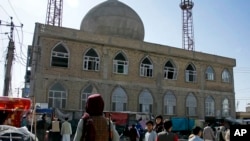In the 12 months since the United States withdrew from Afghanistan and the Taliban took over control of the South Asian nation, the Islamic State Khorasan Province (ISKP), the IS terror outfit’s regional affiliate, remains a formidable armed actor, experts say.
They also say the recent killing of al-Qaida leader Ayman al-Zawahiri in Kabul in a U.S. drone attack has given another opportunity to ISKP to recruit more fighters. Al-Zawahiri was described as a key architect of the terrorist attacks on the United States on September 11, 2001.
The experts say his killing adds an element of uncertainty to Afghanistan's volatile mix, and the ISKP, also known as ISIS-K, has already intensified its propaganda by accusing the Taliban of failing to protect al-Zawahiri, or even of being complicit in the raid.
The Taliban said the strike was a violation of international laws and the deal with the United States on the U.S. troop withdrawal last year. The deal signed in Qatar in February 2020 also called on the Taliban, the then-insurgent group, to keep transnational terrorists from operating in Afghanistan. The U.S. blamed the Taliban for violating the agreement.
Riccardo Valle, an Italian researcher tracking ISKP and its jihadi propaganda, said that in the past year, the ISKP has increased its attacks, mainly targeting Taliban leaders and supporters, and the Shia community, across Afghanistan.
“Most interestingly, the ISKP’s attacks have been occurring on the country's northern parts, including Balkh, Kunduz, Takhar, and Mazar Sharif, where the terror group was less active before Kabul fell in August last year,” Valle told VOA.
Last August, the Sunni-based ISKP claimed an attack on the Shia community that killed eight people and injured dozens of others in the Afghan capital. The experts see such attacks as attempts to attract new recruits and challenge the new rulers’ ability to govern and maintain security.
Asfandyar Mir, a senior expert at the United States Institute of Peace, said that during the past year, ISKP continues to “attract key Taliban rejectionist constituencies in Afghanistan and Pakistan, as well as other armed groups in Afghanistan who fear abandonment by the Taliban due to international pressure.”
The analysts also say the ISKP is trying to make the Taliban look weak and drive a wedge in the fragile relationships of the Taliban with countries in the region through cross-border violence. The ISKP’s recent propaganda effort targets the Taliban's relations with China, Iran, Pakistan, Russia and Central Asian countries, and it exploits ongoing insurgencies in these places.
“As a part of its strategic regional plan, the ISKP has been showing how militants of various ethnic backgrounds, such as Uyghur, Baloch, and Uzbek in recent terror attacks, are conducting operations involving suicide bombings,” a former Afghan intelligence official, requesting anonymity for security reasons, told VOA. “The ISKP wants to project itself as a transnational jihadi group, and most importantly, make the neighboring countries worried.”
“Growing ISKP activity along the borders of Pakistan, Tajikistan, and Uzbekistan has caught the attention of the governments of all three countries in different ways,” Mir told VOA. “It has raised questions about the Taliban’s capability to deal with the group and deepened concerns of scenarios of Taliban fragmentation. Beyond that, there is no coherent or coordinated response from the region.”
Although Uzbekistan and Tajikistan have denied that rockets fired by the ISKP have reached their territories, the United Nations Security Council fears that “the risk of similar attacks remains.”
A UNSC report released in mid-July noted the terror group views Afghanistan as a base for expansion in the wider region for the realization of its “great caliphate” project. It also said that on the basis of its payment of higher monthly salaries, the ISKP has recruited about 50 members of the Turkistan Islamic Party (TIP), a Uyghur militant group that Beijing blames for unrest in its western province of Xinjiang and refers to by its former name, the East Turkistan Islamic Movement (ETIM). The ISKP includes fighters from Central Asian countries.
In late July, delegations from nearly 30 countries, including Afghanistan and its neighbors, as well as the United States, attended an international conference on Afghanistan in the Uzbek capital, Tashkent.
“ISKP’s growing strength and Taliban’s capacity to contain the threats the transnational militant group is posing toward neighboring countries was also a major talking point,” an official in Pakistan's Foreign Ministry, who attended the conference, told VOA.
“In its propaganda, the ISKP has been threatening to target strategically important regional development projects, whether it is Beijing’s Belt and Road Initiative projects or the proposed trans-Afghan railway running from the Uzbek-Afghan border through Mazar-e-Sharif and Kabul to Peshawar,” the official added. The Belt and Road Initiative is a multi-trillion-dollar Chinese infrastructure project involving several nations, but it has been criticized as a debt trap aimed at expanding China’s influence.
Ayaz Gul contributed to this report from Islamabad.




